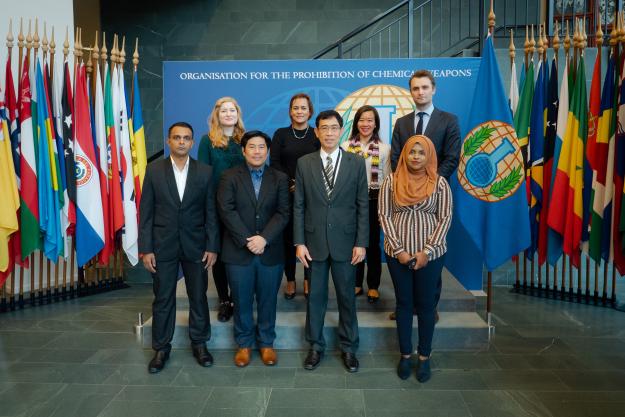
Participants at the Internship Programme for Legal Drafters and National Authority Representatives
THE HAGUE, Netherlands – 12 March 2019 – Representatives of the Marshall Islands and the Maldives produced plans for national implementation of the Chemical Weapons Convention during the 21st session of the Internship Programme for Legal Drafters and National Authority Representatives, held in The Hague, from 4 – 8 March.
The week-long Internship Programme, conducted by the Technical Secretariat of the Organisation for the Prohibition of Chemical Weapons (OPCW), aimed to assist the two states in expediting its national legislative process to implement the provisions of the Chemical Weapons Convention (CWC).
In his remarks, Director of the International Cooperation and Assistance Division at the OPCW Mr Hamza Khelif, stressed that the “enactment of national implementing CWC legislation constitutes the first line of defence against serious threats, including chemical terrorism”, and encouraged participants to take steps to advance legislative process in their countries.
The participants gained detailed knowledge about obligations under the CWC, as well as upgraded their legal drafting skills during a number of practical exercises.
The workshop resulted in the two delegations preparing draft implementing bills and national Action Plans with activities and indicative timelines. These documents will now serve as a reference for the Technical Secretariat to further facilitate the adoption process.
Background
The Internship Programme for Legal Drafters and National Authority Representatives is a legal workshop during which participants are equipped with the technical capacity and requisite skills to complete a draft of national implementing legislation and to pursue its adoption when they return to their home country.
Since its inception in 2012, 45 OPCW Member States have participated in the Programme. Among these, Cape Verde, Grenada, Panama, Paraguay, Uganda and Lao People’s Democratic Republic have successfully enacted national legislation, while others are at various stages of the adoption process.
As the implementing body for the Chemical Weapons Convention, the OPCW, with its 193 Member States, oversees the global endeavour to permanently eliminate chemical weapons. Since the Convention’s entry into force in 1997, it is the most successful disarmament treaty eliminating an entire class of weapons of mass destruction.
Over 97% of all chemical weapon stockpiles declared by possessor States have been destroyed under OPCW verification. For its extensive efforts in eliminating chemical weapons, the OPCW received the 2013 Nobel Peace Prize.
